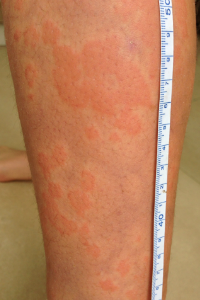Home » Allergies
Allergies
Allergies can be caused by a number of factors, whether liquid, solid or gas! So called “natural” products can cause allergies just the same as man made products.
The most common allergies are to:
- Grass and tree pollen – hay fever
- Dust mites
- Animal
- Food
- Insect bites and stings
- Medication
- Mould
- Household chemicals
Read more about common allergies here.
In This Section
Video support
Video from Dr Geraint Preest coming soon.
 Allergy symptoms
Allergy symptoms
Photo of an allergy rash called “urticaria”. © Dr Preest.
Generally the symptoms of allergies, whilst unpleasant, are not serious and don’t cause too much cause for concern. However, some allergic reactions can be serious and develop rapidly, requiring urgent medical attention.
More common symptoms include:
- Sneezing and an itchy, runny or blocked nose
- Itchy, red, watering eyes
- Wheezing, chest tightness, or a cough
- A raised, itchy, red rash called “urticaria” (see below)
- Swollen lips, tongue or face (beware, because these can be harbingers of more severe reactions)
- Dry, red and cracked skin
Severe allergic reaction (anaphylaxis)
As mentioned above, in very rare cases an allergy can be more serious and lead to anaphylaxis or anaphylactic shock, which can be life-threatening.
This affects the whole body and usually develops within minutes of exposure. Symptoms include:
- Swelling of the throat and mouth
- Difficulty breathing
- Lightheadedness
- Confusion
- Collapsing and losing consciousness
IMPORTANT: Anaphylaxis is a medical emergency that requires immediate treatment. If the above symptoms are present, you should dial 999 for an immediate ambulance response. Click here for important information on what to do.
Allergy testing
Patients often ask about whether it’s possible to be tested “for an allergy”. The aim of the tests is to find out whether there is a specific agent that triggers an allergy response. In some instances this can be done by a “RAST” blood test. Some patients may be referred for “patch testing” but not all patients are suitable for this.
You can read more about allergy testing and patch testing here:
How to minimize the Effects of allergies
In many cases it is not possible to identify the causative factor, but if you know what is causing the allergy, then the following advice may help:
You can:
- Avoid contact with allergens where possible. For example, groom your pets outside, hoover your mattress weekly
- Ask for accurate information if you have an allergy to certain foods. For example, don’t rely on menus for ingredients alone, ask the Chef to confirm
- Take antihistamines at times where you know you may have a reaction
- Patients who experience severe symptoms may need to carry a special “Epi-pen” adrenaline shot (and be trained how to use it)
Read more here.
 Word from our GP
Word from our GP
The patient’s history gives us the best clues about the cause of an allergy so it’s helpful to give us as much information as possible, such as jotting down when and where you experience symptoms. Also, did you know that many people have allergies to the metal nickel? This can give rise to a rash of the earlobe with nickel containing ear-rings or a red patch of eczema where the button of your jeans touches the skin of your belly!
Dr Geraint Preest, New Surgery Pencoed
Things to remember
- Most allergies are not serious but if you have a serious reaction, seek urgent medical advice and if you have problems breathing call 999.
- If the allergy is mild, your Chemist may be able to advise you about the cause and any treatment.
- If you have an allergy to house dust mite, then regular cleaning with an approved vacuum cleaner may help
- Remember that medicines may be a cause of certain allergies, especially if your symptoms have started with a new tablet. Your Chemist will be able to advise.
- Having pets will increase the risk of allergy if you are sensitive to them or any allergens that they may carry
